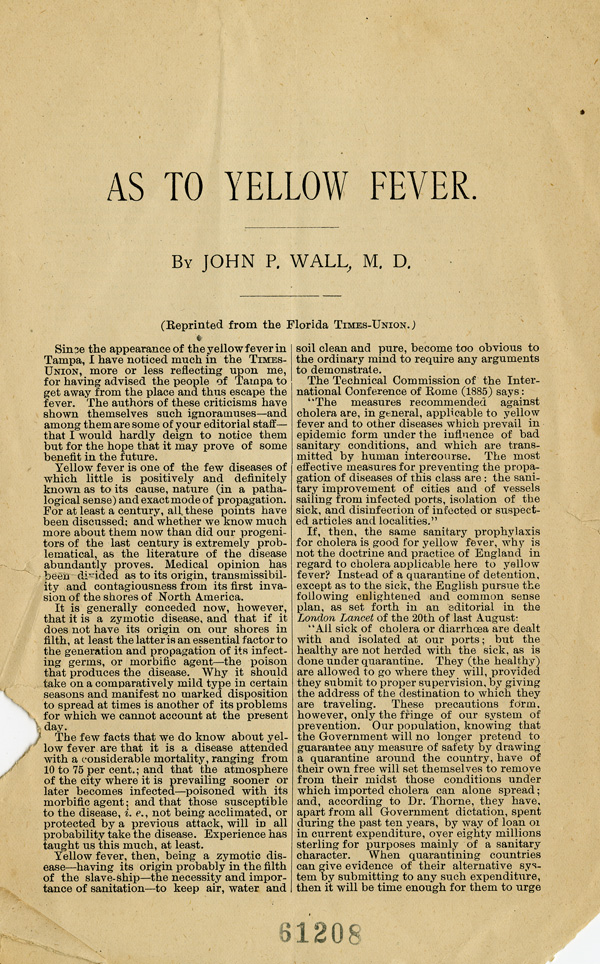"As To Yellow Fever"
Author: Author: Wall, John P. (John Perry), b. 1867
Date: n.d.
Series: S 915
(Page 2 of 6)
Transcript
AS TO YELLOW FEVER
By John P. Wall, M. D.
(Reprinted from the Florida Times Union)
Pg. 1/Column 1
Since the appearance of the yellow fever in
Tampa, I have noticed much in the Times-
Union, more or less reflecting upon me,
for having advised the people of Tampa to
get away from the place and thus escape the
fever. The authors of these criticisms have
shown themselves such ignoramuses – and
among them are some of your editorial staff
that I would hardly deign to notice them
but for the hope that it may prove of some
benefit in the future.
Yellow fever is one of the few diseases of
which little is positively and definitely
known as to its cause, nature (in a patha-
logical sense) and exact mode of propagation.
For at least a century, all these points have
been discussed: and whether we know much
more about them now than did our progeny-
tors of the last century is extremely prob-
lematical, as the literature of the disease
abundantly proves. Medical opinion has
been divided as to its origin, transmissibil-
ity and contagiousness from its first inva-
sion of the shores of North America.
It is generally conceded now, however,
that it is a xymotic disease, and that if it
does not have its origin on our shores in
filth, at least the latter is an essential factor to
the generation and propagation of its infect-
ing germs, or morbitic agent – the poison
that produces the disease. Why it should
take on a comparatively mild type in certain
seasons and manifest no marked disposition
to spread at times is another of its problems
for which we cannot account at the present
day.
The few facts that we do know about yel-
low fever are that it is a disease attended
with a considerable mortality, ranging from
10 to 75 per cent.; and that the atmosphere
of the city where it is prevailing sooner or
later becomes infected – poisoned with its
morbific agent; and that those susceptible
to the disease, i.e., not being acclimated, or
protected by a previous attack, will in all
probability take the disease. Experience has
taught us this much, at least.
Yellow fever, then, being a xymotic dis-
ease – having its origin probably in the filth
of the slave ship – the necessity and import-
tance of sanitation – to keep air, water and
Column 2
soil clean and pure, become too obvious to
the ordinary mind to require any arguments
to demonstrate.
The Technical Commission of the Inter-
national Conference of Rome (1885) says:
“The measures recommended against
cholera are, in general, applicable to yellow
fever and to other diseases of this class are: the sani-
tary improvement of cities and of vessels
sailing from infected ports, isolation of the sic,
and disinfection of infected or suspect-
ed articles and localities.”
If, then, the same sanitary prophylaxis
for cholera is good for yellow fever, why is
not the doctrine and practice of England in
regard to cholera applicable here to yellow
fever? Instead of a quarantine of detention,
except as to the sick, the English pursue the
following enlightened and common sense
plan, as set forth in an editorial in the
London Lancet of the 20 th of last August:
“All sick of cholera or diarrhea are dealt
with and isolated at our ports; but the
healthy are not herded with the sick, as is
done under quarantine. They (the healthy
are allowed to go where they will, provided
they submit to proper supervision, by giving
the address of the destination to which
they are traveling. These precautions form,
however, only the fringe of our system of
prevention. Our population, knowing that
the Government will no longer pretend to’
guarantee any measure of safety by drawing
a quarantine around the country, have of
their own free will set themselves to remove
from their midst those conditions under
which imported cholera can alone spread;
and, according to Dr. Thorne, they have,
apart from all Government dictation, spent
during the past ten years, byway of loan or
in current expenditure, over eighty millions
sterling for purposes mainly of a sanitary
character. When quarantining countries
can give evidence of their alternative sys-
tem by submitting to any such expenditure,
then it will be time enough for them to urge

 Listen: The World Program
Listen: The World Program
